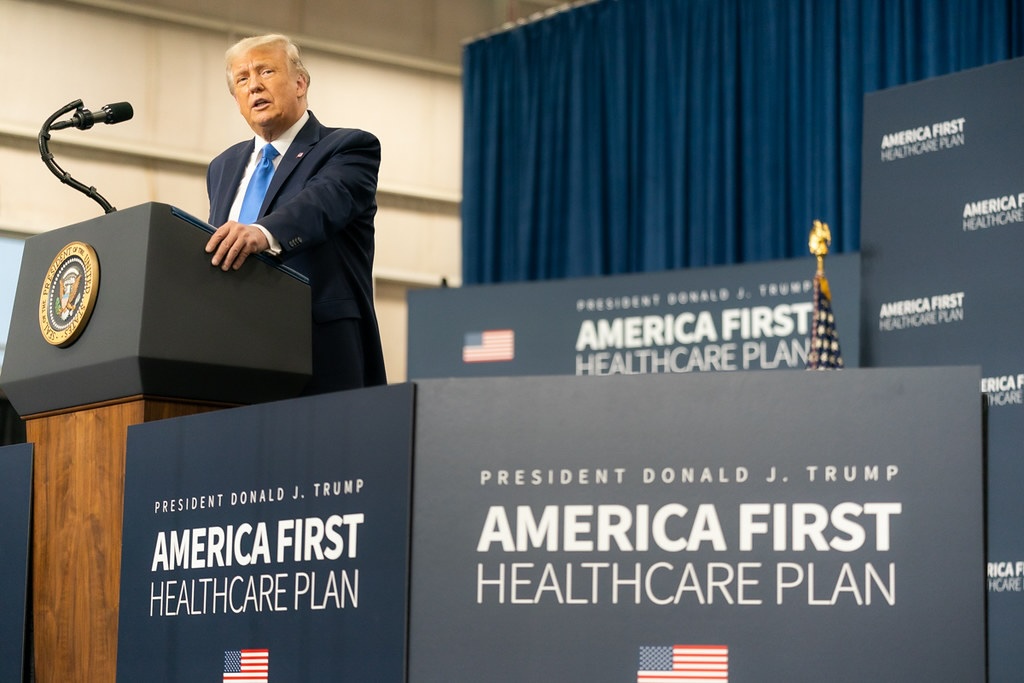Beginning in 2016, President Trump has incorporated the idea of “America First” into his campaign. This idea has existed since World War I and includes hesitant intervention in foreign affairs and protectionist trade policies to elevate American nationalism. Many support Trump because of this policy, hoping he would prioritize their country’s and its people’s needs. However, these foreign policies will not successfully prioritize American concerns.
On his first day in office, Trump withdrew the United States from the Paris Agreement as part of his “America First” policy. The Paris Agreement, formed in 2015, intends to limit the rise in temperature to below two degrees Celsius above pre-industrialization levels. Trump’s logic for withdrawing the U.S. from the agreement was to stop American dollars from flowing out of the country through international collaboration. While the Paris Agreement is costly upfront, the funding helps combat climate change and save lives. However, this can avoid larger spending in the future by helping prevent natural disasters like the recent Los Angeles wildfires, which cost the U.S. around one billion dollars in damages. In withdrawing from the Paris Agreement, President Trump is leaving the U.S. and its citizens unprepared for future climate disasters that might occur and could be prevented by initiatives created by the Paris Agreement.
A few weeks later, President Trump placed tariffs on Chinese, Canadian and Mexican goods to make the U.S. economy more reliant on internally produced goods instead of importing large amounts of products and materials. The tariffs work by charging U.S. companies an additional cost if they import goods from any of these countries. In turn, these companies must raise the prices of their products to maintain previous profits. These price increases affect the entire U.S. population but significantly hurt working class members, many of whom rely on these products made from foreign materials due to cost or accessibility. Instead of being used to help U.S. citizens, the tariffs funnel straight to the Treasury and the federal government in general. Additionally, in retaliation to President Trump’s tariffs, the Chinese government imposed its own tariffs on American goods and launched an investigation into Google, an American company. By sparking this “trade war” with China, inhabitants of both nations lose capital, while their respective governments profit off of the tariffs paid by their own citizens.
Another of Trump’s “America First” initiatives was to withdraw the U.S. from the World Health Organization (WHO), whose central role is directing responses to emergencies across the globe. Trump’s logic behind this decision was that he believed the WHO mishandled the COVID-19 pandemic, even though WHO-recommended vaccination protocols helped to end the pandemic. Additionally, part of his frustration with the WHO came from the idea that the U.S. supplied too much of the WHO’s funding, as 15% of funding came from the U.S. government. While on paper, President Trump is saving American taxpayer dollars from flowing into an organization not run solely by the US, this withdrawal comes at a time when the U.S. is especially vulnerable to health crises. Across the US, human infection rates from Bird Flu are rising steadily. Currently, no approved vaccine for Bird Flu can be administered to humans. Without the U.S. as a member of the WHO, U.S. citizens now lack the resources to help combat this virus as would be allocated by membership. Instead of putting America first, as proposed, this initiative instead puts saving money and the preservation of American autonomy above the well-being of American citizens.
Additionally, Trump’s campaign plan to deport large numbers of undocumented immigrants to places outside of the U.S. will be detrimental to the American economy and the nation’s prosperity. Trump has failed to realize that a large number of the agricultural workforce is made up of undocumented immigrants. In deporting so many people, Trump will fail to fulfill his promise to lower grocery prices. Both of these initiatives were made to put America first, however, they will instead put all American citizens at a disadvantage. Instead of lowering grocery prices for average Americans, deporting undocumented immigrants will increase the cost of food and hurt the American public. In addition to agriculture, undocumented immigrants make up almost 5% of the workforce. By deporting them, these jobs that are often undesirable but essential to the American public would remain unfilled.
Another executive order passed by President Trump suspended the entrance of undocumented migrants to the US, and the Border Patrol must now turn away the people who are trying to enter. A different executive order restarted the “Remain in Mexico” program. This makes asylum seekers, who are not all Mexican, wait for their U.S. hearing dates in Mexico. With the increased difficulty of entering the US. legally, many will now enter the U.S. without passing the Patrol. This will be very dangerous and unsafe with large amounts of people trying to cross rivers and border walls. Since 2000, the Border Patrol has found about 10,000 remains of migrants on U.S. ground. Without having the U.S. and Mexico border accessible to immigrants, there could be an increase in deaths due to the lack of protection as people attempt to cross the border.
President Trump’s “America First” foreign policy initiatives will not successfully prioritize American concerns. Instead of promoting the good of the American people, these initiatives will only serve to promote Trump’s personal agenda. A true “America first” policy would consider the ramifications for the American public because of certain initiatives. However, Trump’s policies turn a blind eye to the actual problems caused in favor of disguising his true motives under “America First.”











































